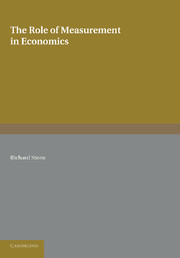Book contents
- Frontmatter
- Contents
- List of Tables
- List of Diagrams
- Preface
- INTRODUCTION
- FOUR ASPECTS OF THE PROBLEM OF MEASUREMENT
- IV Facts and Empirical Constructs
- V Deductively Formulated Theories and their Verification
- VI Postulates for the Theory of Choice
- VII The Estimation of Parameters
- VIII The Nature of Prediction
- IX A Simple Model
- X The Development of a Linear Model over Time
- XI Prediction and Economic Policy
- XII Practical Objections to Exact Models
- XIII Prediction from Static Models
- SOME ILLUSTRATIONS OF THE PROBLEMS OF MEASUREMENT
V - Deductively Formulated Theories and their Verification
from FOUR ASPECTS OF THE PROBLEM OF MEASUREMENT
Published online by Cambridge University Press: 05 June 2016
- Frontmatter
- Contents
- List of Tables
- List of Diagrams
- Preface
- INTRODUCTION
- FOUR ASPECTS OF THE PROBLEM OF MEASUREMENT
- IV Facts and Empirical Constructs
- V Deductively Formulated Theories and their Verification
- VI Postulates for the Theory of Choice
- VII The Estimation of Parameters
- VIII The Nature of Prediction
- IX A Simple Model
- X The Development of a Linear Model over Time
- XI Prediction and Economic Policy
- XII Practical Objections to Exact Models
- XIII Prediction from Static Models
- SOME ILLUSTRATIONS OF THE PROBLEMS OF MEASUREMENT
Summary
I now turn to the second class of question, namely that concerned with testing hypotheses or theories. The usefulness of observation and measurement in testing economic theories arises because the theorems of economics are supposed to relate to the actual world. Any economic theorem rigorously deduced from given postulates may be regarded as an hypothesis about the actual world which experience may show to be false. Indeed, the whole economic as opposed to mathematical interest in the theorem lies in its truth or falsity and not merely in its logical relationship to the postulates. But theorems which say something about the actual world cannot be derived solely from postulates which do not, but instead are purely formal in character. Consequently, the postulates which by their very nature cannot be tested directly by economic experience require to be tested by testing the theorems. This is the normal method of science and is clearly not without its difficulties from a logical point of view. For the argument runs as follows. If postulates, then theorems: as the theorems are verified, therefore the postulates are verified. But this is only true if there is a one-one relationship between the postulates and theorems which in general there will not be. Consequently, it is much easier to show that a theory is false than that it is highly probable that it is true.
It has been suggested that economics, unlike the natural sciences, can and in fact does proceed by a direct verification of the postulates. If this were possible it would indeed be a great gain since we could avoid the fallacy of affirming the consequent noted above. I shall return to this question after a brief treatment, by way of example, of the theory of choice.
The theory of choice, or preference, is perhaps the most highly developed branch of economics and is of particular interest since, like many branches of the natural sciences, it possesses a fully worked out, deductively formulated theory. Such a theory, by which I mean one in which the theorems are rigorously deduced from an initial set of objects and relationships which are concepts by postulation, does not in economics or any other empirical science suddenly arise in the mind of a great philosopher without any considerations of an empirical kind. Rather the procedure is somewhat as follows.
- Type
- Chapter
- Information
- The Role of Measurement in Economics , pp. 12 - 15Publisher: Cambridge University PressPrint publication year: 2013



